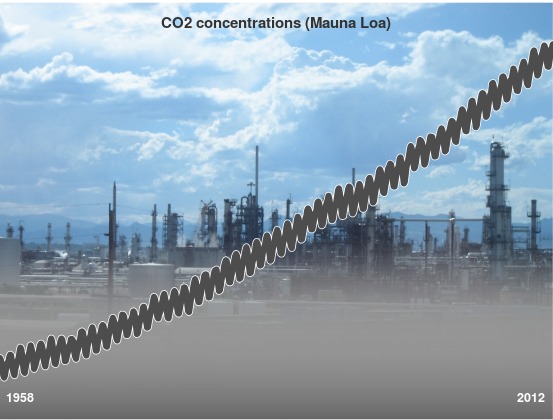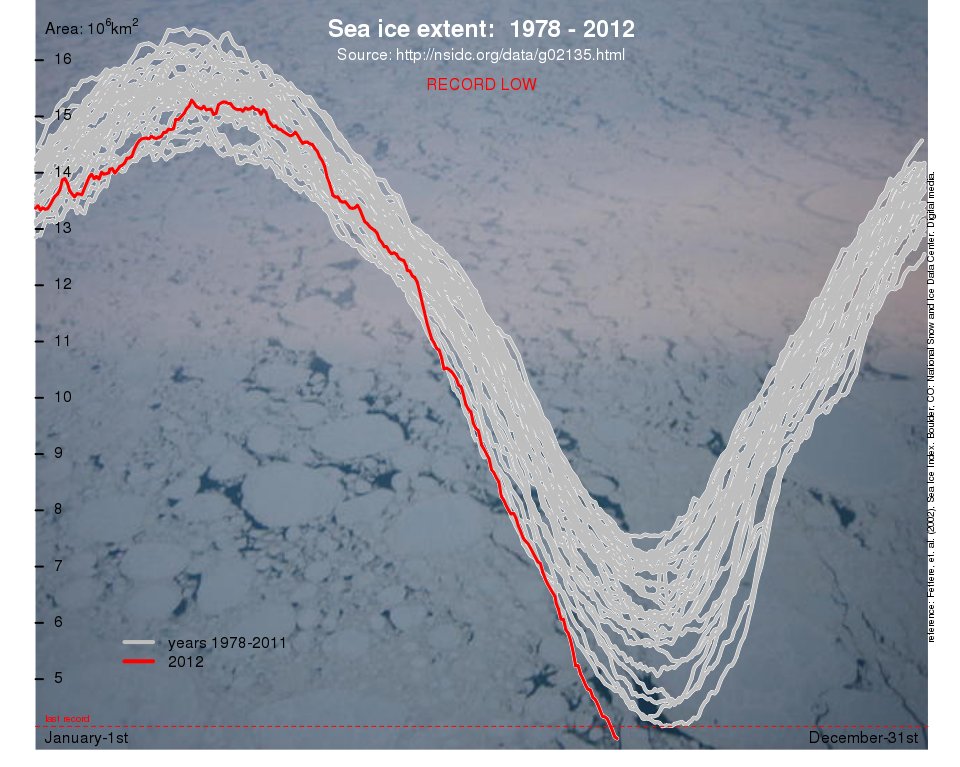This month’s open thread. Try to keep it at least vaguely focused on climate science…!
Archives for 2012
Embargos and confidentiality
This post is not about climate science, but rather about the science/media interface.
As many of you may be aware, papers that are scheduled to appear in high-profile journals (Science, Nature and a few others) are often released a few days early to journalists under embargo in order to give them a chance to do a fuller story and talk to more people about it prior to filing. On balance, this works reasonably well, and the press stories that come out are on the whole better for it (there is a bigger issue with the need for a news peg for most science stories that this practice dominates, but that isn’t the focus of this post).
But Carl Zimmer and Maggie Koerth-Baker recently reported on a situation where a high profile paper was only provided to journalists under embargo if they signed a non-disclosure agreement restricting their ability to show it to other scientists for comment.
This is both very unusual and, frankly, appalling. Science and science publishing are not a branch of the PR industry but part of an open and self-critical process of inquiry. Authors and scientists who do not want their results discussed and/or criticised should not submit them for publication in the first place. As Koerth-Baker and Zimmer make clear, articles about new papers that are simply reworded official statements are not journalism at all. Indeed, the need for journalists to get an unaffiliated opinion from the author’s peers is an essential check on the occasional tendency of press releases to go over the top when pushing a particular study, and is something that should be happening more, not less.
This post is really just about putting on record that this is not a practice that ‘scientists’ are advocating for and we, like the journalists linked above, would strongly advise that if such conditions are imposed, journalists, journals and editors do not accede to them. That will help resolve the issue of whether ‘no publicity’ is indeed preferable.
Finally, while I am sort of on the topic of science journalism, can’t we please, please, please mandate the citation of the DOI tag in any online story about a new paper? Tracking down the actual paper being described is all-too-often far more difficult than it needs to be. (For example, the doi for the study referred to above took four links and a targeted google search to find. Why?).
Science journalism is going through a tough time at the moment, and practices that take the reporting of science further away from science as a process and more towards the repetition of ‘gee whiz’ factoids, should be resisted by anyone who cares about the public’s engagement with science.
References
- G. Séralini, E. Clair, R. Mesnage, S. Gress, N. Defarge, M. Malatesta, D. Hennequin, and J.S. de Vendômois, "RETRACTED: Long term toxicity of a Roundup herbicide and a Roundup-tolerant genetically modified maize", Food and Chemical Toxicology, vol. 50, pp. 4221-4231, 2012. http://dx.doi.org/10.1016/j.fct.2012.08.005
Why bother trying to attribute extreme events?
Nature has an interesting editorial this week on the state of the science for attributing extreme events. This was prompted by a workshop in Oxford last week where, presumably, strategies, observations and results were discussed by a collection of scientists interested in the topic (including Myles Allen, Peter Stott and other familiar names). Rather less usual was a discussion, referred to in the Nature piece, on whether the whole endeavour was scientifically worthwhile, and even if it was, whether it was of any use to anyone. The proponents of the ‘unscientific and pointless’ school of thought were not named and so one can’t immediately engage with them directly, but nonetheless the question is worthy of a discussion.
[Read more…] about Why bother trying to attribute extreme events?
El Nino’s effect on CO2 causes confusion about CO2’s role for climate change
Are the rising atmospheric CO2-levels a result of oceans warming up? And does that mean that CO2 has little role in the global warming? Moreover, are the rising levels of CO2 at all related to human activity?
These are claims made in a fresh publication by Humlum et al. (2012). However, when seeing them in the context of their analysis, they seem to be on par with the misguided notion that the rain from clouds cannot come from the oceans because the clouds are intermittent and highly variable whereas the oceans are just there all the time. I think that the analysis presented in Humlum et al. (2012) is weak on four important accounts: the analysis, the physics, reviewing past literature, and logic.
[Read more…] about El Nino’s effect on CO2 causes confusion about CO2’s role for climate change
References
- O. Humlum, K. Stordahl, and J. Solheim, "The phase relation between atmospheric carbon dioxide and global temperature", Global and Planetary Change, vol. 100, pp. 51-69, 2013. http://dx.doi.org/10.1016/j.gloplacha.2012.08.008
Unforced variations: Sep 2012
Climate indices to watch
What is the most important climate condition to keep tabs on? We have recently mentioned the record-low Arctic sea-ice extent, but hurricanes this year seem to be getting the most attention because of timing ofHurricane Isaac (I know of no evidence suggesting that the Arctic sea-ice has such a direct impact on U.S. politics!).
In addition, the status of ENSO issued by NOAA on August 27, 2012, states that El Niño conditions are likely to develop during August or September 2012, although the present state is classified as ‘ENSO-neutral‘. El Niño has a strong influence on local economies and societies in fairly extensive regions of the world. ENSO is a natural phenomenon, but may change under a changing climate and is interesting to watch over the long term.
It’s important to avoid getting lost into single indicators, however, as the climate system is complex, with many different parts interacting with one another. The American Meteorological Society (AMS) recently put out a statement on climate change, referring to a wide range of different climate indicators (here is a link for the most common ones). The AMS is not alone – the National Academy for Sciences (NAS) is also concerned about our climate and its many aspects: A fairly recent movie called Climate change at the NAS Climate Change: Lines of Evidence provides a comprehensive overview.
Both AMS and NAS accounts provide a rich picture of many different aspects with many different (important) details, which make them fairly long and complicated. This is why simple indices sometimes are used – to convey a simple message. We need both, and that’s why the NAS video and the AMS statement are so valuable – at least for the readers who understand what they are talking about. I’m not sure that everybody does, though.
An update on the Arctic sea-ice
We noted earlier that the Artic sea-ice is approaching a record minimum. The record is now broken, almost a month before the annual sea-ice minima usually is observed, and there is probably more melting in store before it reaches the minimum for 2012 – before the autumn sea-ice starts to form.
The figure shows annual variations in the area of sea-ice extent, and the x-axis marks the time of the year, starting on January 1st and ending on December 31st (for the individual years). The grey curves show the Arctic sea-ice extent in all previous years, and the red curve shows the sea-ice area for 2012.
(The figure is plotted with an R-script that takes the data directly from NSIDC; the R-environment is available from CRAN)
UPDATE on the update The National Snow and Ice Data Center announced today (August 27th, 2012) that the 2007 record has now been broken by their more conservative 5-day running average criterion. They also note that “The six lowest ice extents in the satellite record have occurred in the last six years (2007 to 2012).”
Antarctic Peninsula warming: natural variability or “global warming”?
Most people know that the Antarctic Peninsula is one of the most rapidly warming places on earth. But like everywhere else in Antarctica, the length of available temperature data is short — most records begin in 1957 (when stations were put in place during the International Geophysical Year); a few start in the late 1940s. This makes the recent rapid warming difficult to evaluate; in general, what’s interesting is how the trend compares with the underlying variability. As anyone who’s been there can tell you, the weather on the Antarctic Peninsula is pretty wild, and this applies to the climate as well: year to year variability is very large. Put another way, the noise level is high, and discerning the signal requires more data than is available from the instrumental temperature record. This is where ice cores come in handy — they provide a much longer record, and allow us to evaluate the recent changes in a more complete context.
A new paper in Nature this week presents results from an ice core drilled by the British Antarctic Survey (BAS) at James Ross Island on the Antarctic Peninsula. [Read more…] about Antarctic Peninsula warming: natural variability or “global warming”?
Language Intelligence – Lessons on persuasion from Jesus, Shakespeare, Lincoln, and Lady Gaga: A Review
Any book that manages to link together the lessons of the Bible, Shakespeare, Abraham Lincoln, and Lady Gaga (not to mention Martin Luther King, Winston Churchill, Bob Dylan, and Jerry Seinfeld), can’t be all bad. With Joe Romm’s new book Language Intelligence, it is, in fact, ALL good. There are lessons galore for the scientists among us who value public outreach and communication. The book is a de facto field guide for recognizing and assimilating many of the key tools of persuasive language and speech, something that is ever more important to science communicators who face the daunting challenge of having to communicate technical and nuanced material to an audience largely unfamiliar with the lexicon of science, sometimes agnostic or even unreceptive to its message, and—in the case of contentious areas like climate change and evolution—already subject to a concerted campaign to misinform and confuse them.
[Read more…] about Language Intelligence – Lessons on persuasion from Jesus, Shakespeare, Lincoln, and Lady Gaga: A Review
Extreme metrics
There has been a lot of discussion related to the Hansen et al (2012, PNAS) paper and the accompanying op-ed in the Washington Post last week. But in this post, I’ll try and make the case that most of the discussion has not related to the actual analysis described in the paper, but rather to proxy arguments for what people think is ‘important’.
[Read more…] about Extreme metrics
References
- J. Hansen, M. Sato, and R. Ruedy, "Perception of climate change", Proceedings of the National Academy of Sciences, vol. 109, 2012. http://dx.doi.org/10.1073/pnas.1205276109

